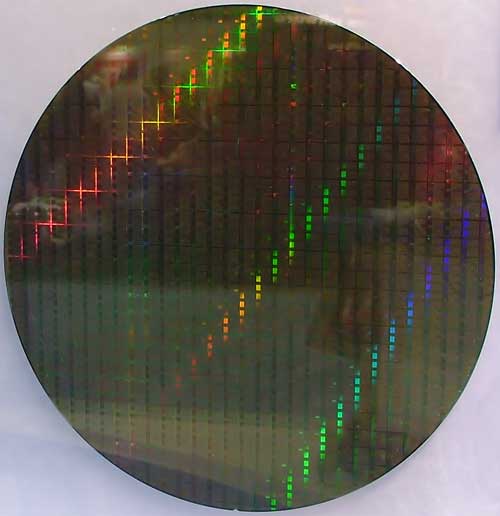WinHEC 2005 - Keynote and Day 1
by Derek Wilson & Jarred Walton on April 26, 2005 4:00 AM EST- Posted in
- Trade Shows
Day One Conclusion
That takes care of the major talks of day one. There were other interesting things that we saw on the showroom floor, including working servers running the 1.72 billion transistor Monticeto processors (Itanium 2). We'll try to get some better shots of the setup tomorrow, but suffice it to say the die size is HUGE - even in comparison to the already rather large Smithfield die.
So far, everyone is putting on a good front for the XP-64 launch. We'll try to see how it really stacks up in our own analysis soon. Stay tuned.










36 Comments
View All Comments
JarredWalton - Saturday, April 30, 2005 - link
KHysiek - part of the bonus of the Hybrid HDDs is that apparently Longhorn will be a lot more intelligent on memory management. (I'm keeping my fingers crossed.) XP is certainly better than NT4 or the 9x world, but it's still not perfect. Part of the problem is that RAM isn't always returned to the OS when it's deallocated.Case in point: Working on one of these WinHEC articles, I opened about 40 images in Photoshop. Having 1GB of RAM, things got a little sluggish after about half the images were open, but it still worked. (I wasn't dealing with layers or anything like that.) After I finished editing/cleaning each image, I saved it and closed it.
Once I was done, total memory used had dropped from around 2 GB max down to 600 MB. Oddly, Photoshop was showing only 60 MB of RAM in use. I exited PS and suddenly 400 MB of RAM freed up. Who was to blame: Adobe or MS? I don't know for sure. Either way, I hope MS can help eliminate such occurrences.
KHysiek - Friday, April 29, 2005 - link
PS. In this case making hybrid hard drives with just 128MB of cache is laughable. Windows massive memory swapping will ruin cache effectiveness quickly.KHysiek - Friday, April 29, 2005 - link
Windows memory management is one of the worst moments in history of software development. It made all windows software bad in terms of managing memory and overall performance of OS. You actually need at least 2x of memory neede by applications to work flawlessly. I see that saga continues.CSMR - Thursday, April 28, 2005 - link
A good article!Regarding the "historical" question:
Strictly speaking, if you say "an historical" you should not pronounce the h, but many people use "an historical" and pronounce the h regardless.
Pete - Thursday, April 28, 2005 - link
That's about how I reasoned it, Jarred. The fisherman waits with (a?)bated breath, while the fish dangles from baited hook. Poor bastard(s).'Course, when I went fishing as a kid, I usually ended up bothering the tree frogs more than the fish. :)
patrick0 - Wednesday, April 27, 2005 - link
If Microsoft manages graphics memory, it will sure be a lot easier to read this memory. This can make it easier to use the GPU as a co-processor to do non-graphics tasks. Now I could manage image-processing, but this doesn't sound like a no-graphcs task, does it? Anyways, it is a cpu task. Neither ATI nor nVidia has made it easy so far to use the GPU as co-processor. So I think ms managing this memory will be an improvement.JarredWalton - Wednesday, April 27, 2005 - link
Haven't you ever been fishing, Pete? There you sit, with a baited hook waiting for a fish to bite. It's a very tense, anxious time. That's what baited breath means.... Or something. LOL. I never really thought about what "bated breath" actually meant. Suspended breath? Yeah, sure... whatever. :)Pete - Wednesday, April 27, 2005 - link
Good read so far, Derek and Jarred. Just wanted to note one mistake at the bottom of page three: bated, not baited, breath.Unless, of course, they ordered their pie with anchovies....
Calin - Wednesday, April 27, 2005 - link
"that Itanium is not dead and it's not going anywhere"I would say "that Itanium is not dead but it's not going anywhere"
JarredWalton - Tuesday, April 26, 2005 - link
26 - Either way, we're still talking about a factor of 2. 1+ billion vs. 2+ billion DIMMs isn't really important in the grand scheme of things. :)23 - As far as the "long long" vs "long", I'm not entirely sure what you're talking about. AMD initially made their default integer size - even in 64-bit mode - a 32-bit integer (I think). Very few applications really need 64-bit integers, plus fetching a 64-bit int from RAM requires twice as much bandwidth as a 32-bit int. That's part one of my thoughts.
Part 2 is that MS may have done this for code compatibility. While in 99% of cases, an application really wouldn't care if the 32-bit integers suddenly became 64-bit integers, that's still a potential problem. Making the user explicitly request 64-bit integers gets around this problem. Things are backwards compatible.
Anyway, none of that is official, and I'm only partly sure I understand what you're asking in the first place. If you've got some links for us to check out, we can look into it further.